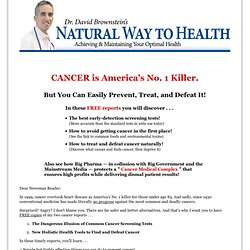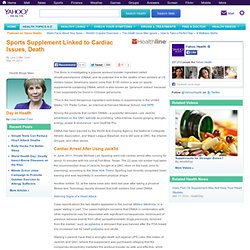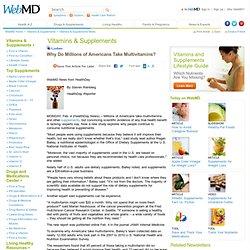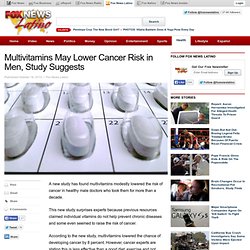

CANCER is America's No. 1 Killer. CANCER is America's No. 1 Killer.

But You Can Easily Prevent, Treat, and Defeat It! In these FREE reports you will discover . . . The best early-detection screening tests! (More accurate than the standard tests in wide use today)How to avoid getting cancer in the first place! (See the link to common foods and environmental toxins)How to treat and defeat cancer naturally! Dear Newsmax Reader: In 1999, cancer overtook heart disease as America's No. 1 killer for those under age 85. Surprised? The Dangerous Illusion of Common Cancer Screening TestsNew Holistic Health Tools to Find and Defeat Cancer In these timely reports, you'll learn . . . > Simple but highly effective things you can do to prevent cancer! What You Learn in Your Two FREE Reports Could Save Your Life! Hi, I'm Dr. I'm an American-trained medical doctor with a private practice in West Bloomfield, Mich. Drugs and other treatments that do more harm than good! It's been my pleasure to do this, and Dr.
What else can be said? Think! Nike lunarlon review. Sports Supplement Linked to Cardiac Issues, Death. The Army is investigating a popular workout booster ingredient called dimethylamylamine (DMAA) and its potential link to the deaths of two soldiers at US military bases.

Americans spend more than $100 million a year on sports supplements containing DMAA, which is also known as “geranium extract” because it can supposedly be found in Chinese geraniums. “This is the most dangerous ingredient sold today in supplements in the United States," Dr. Pieter Cohen, an internist at Harvard Medical School, told NPR. Among the products that contain DMAA—a powerful stimulant—are Jack3d, advertised on the GNC website as providing “ultra-intense muscle-gorging strength, energy, power & endurance,” and OxyElite Pro. DMAA has been banned by the World Anti-Doping Agency, the National Collegiate Athletic Association, and Major League Baseball, but is still sold at GNC, the Vitamin Shoppe, and other stores. Cardiac Arrest After Using Jack3d Warning Signs of a Heart Attack Top 10 Health Risks for Men. With Benefits Unproven, Why Do Millions of Americans Take Multivitamins? Why do I need to register or sign in for WebMD to save?

We will provide you with a dropdown of all your saved articles when you are registered and signed in. WebMD News from HealthDay By Steven Reinberg HealthDay Reporter MONDAY, Feb. 4 (HealthDay News) -- Millions of Americans take multivitamins and other supplements, but convincing scientific evidence of any true health benefit is lacking, experts say. "Most people were using supplements because they believe it will improve their health, but we really don't know whether that's true," said study lead author Regan Bailey, a nutritional epidemiologist in the Office of Dietary Supplements at the U.S.
"Moreover, the vast majority of supplements used in the U.S. are based on personal choice, not because they are recommended by health care professionals," she added. Nearly half of U.S. adults use dietary supplements, Bailey noted, and supplements are a $30-billion-a-year business. Motivational Fitness Pictures. Multivitamins May Lower Cancer Risk in Men, Study Suggests. A new study has found multivitamins modestly lowered the risk of cancer in healthy male doctors who took them for more than a decade.

This new study surprises experts because previous resources claimed individual vitamins do not help prevent chronic diseases and some even seemed to raise the risk of cancer. According to the new study, multivitamins lowered the chance of developing cancer by 8 percent. However, cancer experts are stating this is less effective than a good diet, exercise and not smoking, each of which can lower cancer risk by 20 to 30 percent. “It’s a very mild effect and personally I’m not sure it’s significant enough to recommend to anyone, although it is promising,” said Dr.
Ernest Hawk, Vice President of Cancer Prevention at the University of Texas MD Anderson Cancer Center and formerly of the National Cancer Institute. The study was published online in the Journal of the American Medical Association. Doctors suggest the following tips: